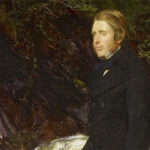John Ruskin
John Ruskin (1819 – 1900) was an English writer, art critic, and philosopher. He wrote on subjects as wide and varied as botany, geology, architecture, myth, literature, education, art, and political economy. Ruskin’s essays, treatises, poetry, travel guides, and lectures had an enormous influence on figures as diverse as Marcel Proust, who translated his works into French, Leo Tolstoy, and Mahatma Gandhi. A champion of the Pre-Raphaelites—including John Everett Millais, who painted his portrait—Ruskin was also an early advocate for the work of J. M. W. Turner, whose paintings formed the central critical subject of Ruskin’s first acclaimed collection of writings, the 1843 book Modern Painters. Ruskin’s stature grew through the First World War, faded somewhat afterward, but has enjoyed a resurrection since the late 1960s. The well-known British writer and cultural commentator Simon Schama remarked that, “John Ruskin invented his own language or at least his own self-devouring syntax, the prose (if that is what it is) hurtling, adamant and operatic.”

